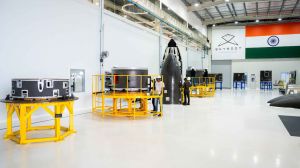In Europe, an old world looks to new frontiers
In the 20th century, and even more in the 21st, one part of the world will stand out for unifying countries, subordinating nationalism and b...

In the 20th century, and even more in the 21st, one part of the world will stand out for unifying countries, subordinating nationalism and building cross-border unity. This is the European Union. The EU has gone through pain and struggle in building a common market, a currency and other commonalties. It is a role model for the rest of the planet.
Yet, the end of the road is still beyond the horizon. The EU society’s structure makes change a huge challenge. One or two economies continue to dominate. This leads to reaction and resistance from smaller EU members.
Old policies, such as subsidies for agriculture, are still in place. The process is beginning slowly. Alternative employment opportunities are distant. Anxiety over joblessness and the impact on politics is natural. There will be a time when subsidies will be a thing of the past. But it will take years to condition the people and wean occupations and livelihoods away from agriculture. History cannot be rewritten even in a decade.
Millions of families have been and are dependent on farming. The way out is difficult. Re-training and new employment and self-employment opportunities are yet to emerge. A time will come when EU will open markets much more than it has. That will be when EU economies are truly globally competitive. Non-tariff barriers will be gone. A major challenge facing EU is the human resource dimension. There is an ageing population, a heavy burden of social security and a shortage of young, skilled knowledge workers.
Building human resource is no short-term business. The EU is conscious of this and has started addressing it in different ways. Another factor that impacts EU is the diversity in stages of development of its members. This will be further aggravated with EU’s expansion to 25 nations.
When can one expect relative economic parity within the EU? A decade? Two decades? This is crucial to the EU’s prosperity.
From the outsider’s perspective, the EU has some specific challenges ahead.
First, how do you get growth back to a higher level? Through exports? Or inward investments? Can the services sector be rapidly expanded, especially tourism? Can manufacturing, particularly SMEs, show new competitiveness in niche areas? Second, how can EU generate more jobs and what kind of jobs? Will outsourcing and partnerships help at least save jobs? How do you avoid jobless growth? How do you create ‘‘new’’ jobs? Are there skills to be developed for this?
Third, how do you correct the ‘‘age’’ issue? Can EU’s population of young people be enlarged through immigration and higher birth rate? This is a key issue because EU needs increasing numbers of young people to fuel growth and manage both social and economic activity.
Fourth, how can the education infrastructure create a pool of knowledge workers, with skills different from those required in a manufacturing economy? Are universities, technical institutions, even schools geared for the knowledge economy? Fifth, like India EU has a variety of languages. For India, the knowledge of English has helped in the new economy. Whether one likes it or not, English is a global language. Perhaps the EU needs to consider the practical benefits of promoting a single language and running what China is — a continental, crash programme.
Sixth, how does EU put money in the hands of citizens, whether to save or spend? More money means lower taxes and lower social security costs. This is critical and impacts government expenditure and deficit management. But it has to be done. One way to do it could be to reduce subsidies. Seventh, in this globalised, increasingly inter-dependent world, how does EU forge longterm partnerships? With which countries?
Eighth, can EU review quality of life, levels of luxury and balance the situation for the greater good of all its citizens? What practical means are there, if any, to make lifestyle adjustment a possibility for the very rich? Ninth, does EU see the need for introspection? This has to go beyond the economy to value systems, with the objective of working out creative solutions to challenges.
One can only appreciate the resolve with which EU is moving ahead to build a new Europe, even a new world. Its experience is learning ground for other regions, especially south Asia.
There are so many strengths within EU. Tourism, technology, manufacturing, midsize entrepreneurship, infrastructure, export-orientation, culture stand out. Actually the list is much, much longer. The EU is unique in world history. It is a process and an idea whose time has come.
(The author is director general, Confederation of Indian Industry)


- 01
- 02
- 03
- 04
- 05





























